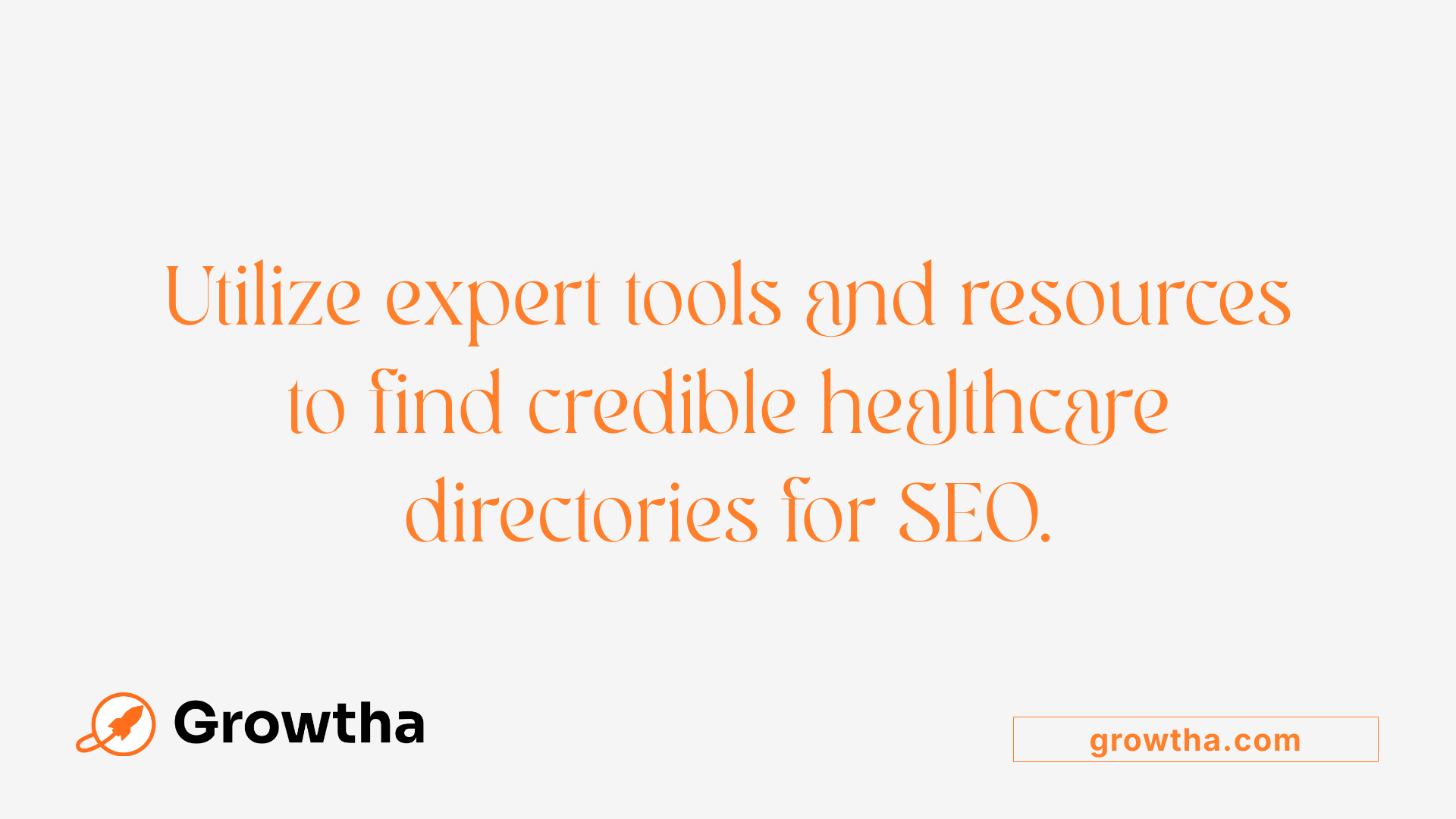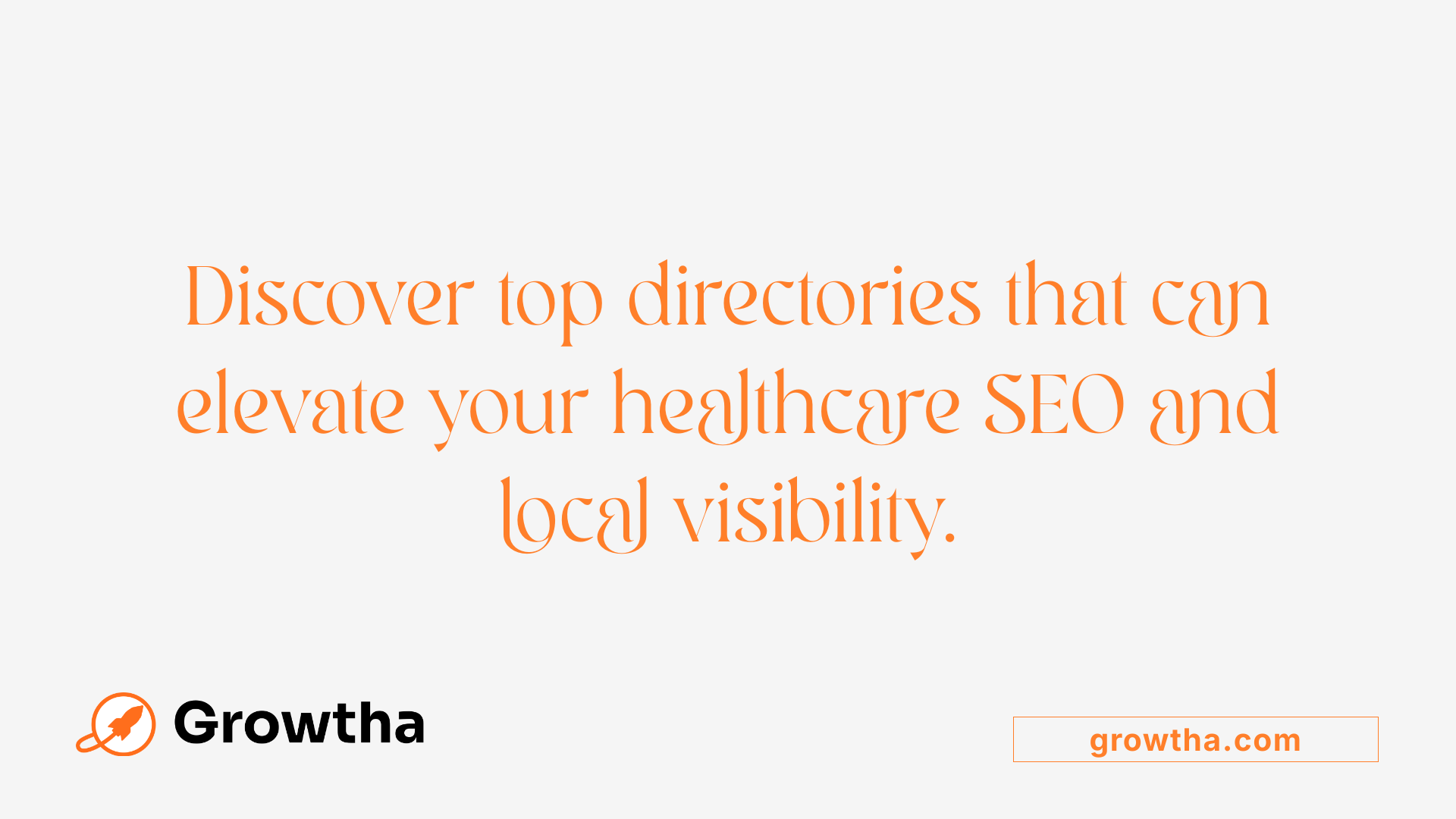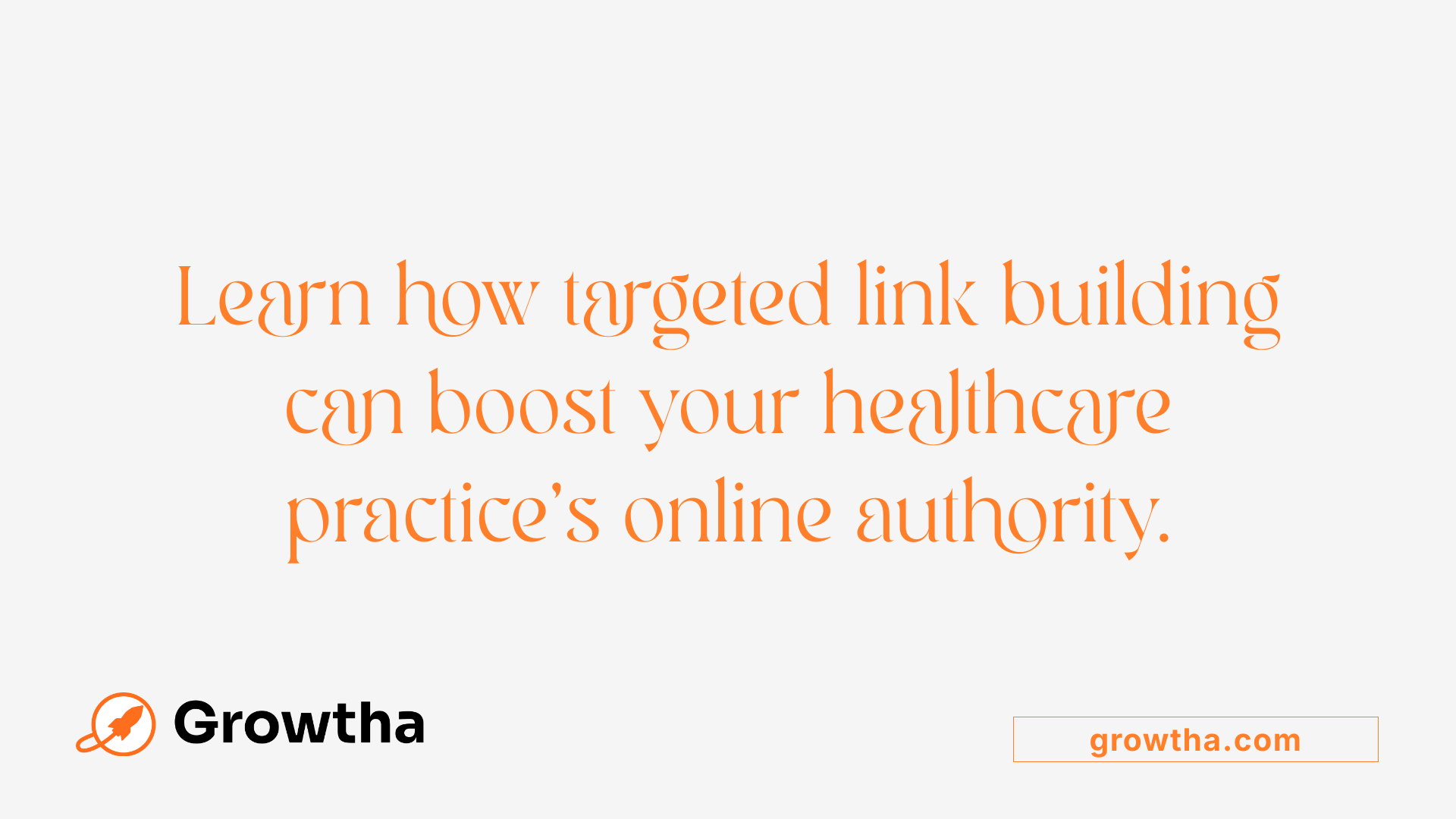Top Directories for Healthcare Link Building
Essential Platforms for Boosting Healthcare SEO via Link Building


Top Directories for Healthcare Link Building
Unlocking the Power of Top Healthcare Directories for SEO Success
In the highly competitive healthcare industry, establishing a robust online presence is crucial. Effective link building through reputable directories not only enhances search engine rankings but also builds authority and credibility. This comprehensive guide explores the most valuable healthcare directories, strategies for leveraging them, and the tools that can help healthcare providers optimize their backlink profiles.
Top Online Healthcare Directories to Consider for Link Building
What are some top online directories for healthcare link building?
In the realm of healthcare SEO, certain online directories stand out as vital resources for building authoritative backlinks. Platforms like WebMD Physician Directory, Healthgrades, and Zocdoc are among the most prominent. They offer substantial backlink opportunities that boost your website's credibility and search engine rankings.
Local directories also play a crucial role. Google My Business, Yelp, and Healthgrades not only improve your local search visibility but also serve as reliable sources for potential patients discovering services nearby. These listings often include reviews, photos, and detailed contact information, which can enhance your online reputation.
Moreover, engaging with community health events and collaborating with local health organizations can generate backlinks from trusted community websites. Leveraging media exposure through platforms like Help A Reporter Out (HARO) provides another avenue for gaining backlinks from well-respected news outlets.
Effective backlink strategies include guest posting on reputable healthcare blogs, creating shareable health content, and working with influencers in the health and wellness sectors. Ensuring your directory listings are accurate, consistent, and optimally filled with relevant details enhances your opportunities to earn high-quality backlinks.
In summary, successful link-building requires a strategic combination of directory listings, content outreach, and engagement with authoritative sources. Regularly evaluating the domain authority, relevance, and trustworthiness of these platforms ensures sustainable SEO growth and increased website authority.
Resources and Tools for Discovering Reputable Healthcare Directories

What resources and tools can assist in finding authoritative healthcare directories?
Finding trustworthy healthcare directories requires leveraging a combination of comprehensive industry resources and analytical tools. One prominent resource is the American Hospital Directory (AHD), which provides extensive data on hospitals across the country, including profiles, utilization statistics, and advanced search capabilities. This helps healthcare providers identify reputable hospital networks and service providers.
Online medical provider directories such as ZocDoc, WebMD, Vitals, and Healthgrades serve as comprehensive platforms for finding healthcare professionals and practices. These directories compile detailed profiles, patient reviews, and practice information, making them invaluable for both patients and practitioners seeking authoritative listings.
For local health departments and government-facilitated directories, NACCHO (National Association of County and City Health Officials) offers a directory to locate local health agencies by location, providing official contact data.
In addition to industry-specific directories, analytical and backlink research tools like Ahrefs, SEMrush, and Moz are essential for uncovering high-quality healthcare directories and assessing their authority. These tools allow users to analyze backlink profiles, domain authority scores, and trust metrics, which help determine the credibility of potential directories.
Combining these resources with careful evaluation strategies—such as checking privacy policies, user engagement, and verification processes—ensures healthcare providers access authoritative and relevant directories that support effective SEO and marketing efforts.
How can healthcare providers identify the most authoritative directories within their niche?
Identifying top-tier, authoritative directories requires a strategic approach using specialized tools and research techniques. Backlink analysis platforms like Ahrefs, SEMrush, and Moz are invaluable for this purpose. They help assess the domain authority, trust flow, and backlink profiles of potential directories.
By analyzing these metrics, healthcare providers can determine which directories are considered credible and are well-regarded within the industry. Cross-referencing data from official healthcare organization reports and industry publications offers additional validation.
Evaluating a directory’s reputation involves reviewing user reviews, verification procedures, and engagement levels such as active listings and patient interactions. Opting for directories that authenticate practitioners and practices enhances trustworthiness.
Furthermore, selecting directories that focus on specific healthcare specialties ensures more targeted exposure. This focus not only improves SEO but also increases the relevance of traffic driven from these platforms, aligning with the provider’s niche and service offerings.
For maximum impact, combining analytical insights with qualitative assessments—like credibility checks and relevance filtering—helps healthcare providers build a robust, authoritative online presence through strategic directory listings.
Maximizing SEO and Visibility Through Directory Listings

How can healthcare websites leverage directories to improve SEO and online visibility?
Healthcare websites can significantly enhance their SEO and online visibility by effectively leveraging online directories. The first step is ensuring each listing is complete and accurate, which includes consistent NAP (Name, Address, Phone number) information across all platforms. Optimizing profiles with relevant keywords related to their services and geographic location helps search engines understand what the practice offers and where it is located.
Having detailed descriptions, service listings, and high-quality images further improves visibility. Claiming profiles on major directories like Google My Business, Healthgrades, and industry-specific sites such as the American Med Spa Association allows healthcare providers to control their online presence. Regularly updating these profiles with new services, staff photos, or patient reviews keeps listings fresh and relevant.
Incorporating structured data markup (schema.org) on their website and ensuring it aligns with directory information can enhance how search engines display business details in search results. Providing backlinks from reputable health directories further boosts site authority.
Consistent citations across multiple directories reinforce trustworthiness and local relevance. Optimizing directory profiles for local search intent helps attract nearby patients actively seeking healthcare services.
Integrating these practices into a comprehensive SEO strategy—focused on high-quality content, technical optimization, and user experience—maximizes online visibility. This strategic approach helps potential patients find and trust healthcare providers more easily, ultimately driving clinical inquiries and appointments.
What are some advanced techniques for maximizing directory listing SEO benefits?
To take directory listing SEO to the next level, healthcare providers should employ advanced techniques. Implementing structured data markup like schema.org enhances listings by enabling rich snippets, such as star ratings, addresses, and service details, which stand out in search results.
Strategic use of local keywords within directory profiles and descriptions makes the listings more relevant to local search queries. Maintaining NAP consistency is crucial; regular audits ensure information remains accurate, especially if services or contact details change.
Active management of online reviews is vital, as reviews influence rankings and patient trust. Responding professionally to reviews fosters engagement and demonstrates attentiveness.
Routinely securing backlinks from high-authority health directories and leveraging niche edits—placing links within relevant existing content—increases site credibility and SEO value.
Digital PR efforts, such as featuring in industry articles or resource lists, can generate additional backlinks and exposure. Pursuing placements in health-related editorial content on reputable sites further amplifies authority.
By combining these techniques—structured data, NAP consistency, review management, and strategic link building—healthcare providers can maximize the SEO benefits of their directory profiles, resulting in higher search rankings and greater local visibility.
The Crucial Role of Directories in Local Search and Reputation Management

What is the importance of directories in healthcare local SEO and online reputation management?
Directories play a vital role in healthcare digital marketing by improving local search rankings and managing online reputation. They serve as authoritative sources that ensure consistent and precise business information across a multitude of platforms. When healthcare providers list their services on directories like Healthgrades, Zocdoc, and WebMD, they increase their visibility for local patients searching for healthcare providers.
These listings contain essential details such as the clinic's name, address, phone number (NAP), and operating hours. Accurate information helps search engines trust the business data, resulting in higher rankings in local map packs and organic search results. Moreover, healthcare-specific directories attract highly relevant traffic, which can translate into more patient inquiries.
Directories also facilitate the collection of reviews and ratings from patients. Patient feedback displayed on these platforms influences new patients' trust and decision-making. High ratings and positive reviews can significantly boost a clinic’s reputation, making it more attractive compared to competitors.
Furthermore, optimized directory profiles, including relevant categories, schema markup, and location-specific keywords, enhance search engine understanding of the practice’s offerings. This strategic approach increases the likelihood of appearing in local search results, especially in densely populated areas.
In summary, maintaining active and accurate directory listings is essential for both improving search visibility and establishing industry trust. They help healthcare providers attract local patients, manage their reputation efficiently, and distinguish themselves in competitive markets.
How can clinics ensure their directory listings are accurate and consistent?
Maintaining current and uniform information across all directories requires a proactive approach. Clinics should conduct regular audits of their online profiles, verifying details such as practice name, address, phone number, services, and hours of operation.
One effective method is to create a master document, like a spreadsheet, listing all directory platforms and the corresponding information. Regularly updating this document ensures consistency across platforms. Setting reminders for routine checks, such as quarterly updates, helps prevent outdated information from harming reputation and SEO.
Utilizing tools like reputation management software can automate listings updates and monitor for inconsistencies. These tools can alert you to discrepancies or outdated data.
Responding promptly to reviews and patient feedback also boosts credibility and demonstrates engagement.
Finally, confirming changes with each platform after updating profiles ensures that all listings reflect the latest, most accurate information. This thorough process improves local SEO performance and patient trust.
Choosing Quality Healthcare Directories for Maximum SEO Impact

How do I select high-quality healthcare directories for backlink opportunities?
Selecting the best healthcare directories for backlinks requires careful assessment of their credibility and relevance. Start by evaluating the authority of the directory—domains with high domain authority (DA) or domain rating (DR) generally offer better SEO value. Look for directories maintained by reputable health organizations, professional associations, or government bodies, which often undergo rigorous verification processes.
Ensure the directory focuses on relevant healthcare specialties aligned with your practice. It should provide detailed, accurate, and up-to-date provider information, including subspecialties and locations, to enhance trustworthiness and visibility.
Verification methods like manual reviews, claims data validation, or secret shopper surveys ensure the data's accuracy and reliability. Additionally, check if the directory supports standardized data formats and interoperability, promoting seamless data sharing among health systems.
Lastly, review the breadth of coverage—covering comprehensive provider details and multiple locations—to maximize the directory’s value for SEO and patient accessibility.
The Case Study of a Targeted Link Building Strategy in Healthcare

Overview of Loopex Digital’s Approach for Drip Hydration
Loopex Digital, a renowned healthcare SEO agency, implemented a focused and strategic link building campaign for Drip Hydration. The core aim was to boost the company’s online visibility and establish its authority within the competitive health and wellness niche. The approach emphasized acquiring high-quality backlinks from trusted, relevant sources, aligning with industry standards and Google's guidelines.
Their strategy involved analyzing the existing backlink profile of Drip Hydration as well as competitors’ link profiles using advanced tools like Ahrefs and SEMrush. This helped identify valuable opportunities for link acquisition from authoritative healthcare websites, directories, and news outlets. The team also prioritized building local links through community engagement and local directory listings to improve local SEO performance.
Creating a Tailored Link-Building Plan Focusing on Authoritative Sites
Loopex Digital designed a bespoke plan emphasizing quality over quantity. The plan focused on securing backlinks from well-established sites with high domain authority (DA) and domain rating (DR). Tactics included:
- Targeted outreach for guest posts on reputable health and wellness blogs.
- Placement of links on relevant resource pages and industry-specific directories.
- Developing shareable content, such as expert interviews and original research, to attract natural backlinks.
- Utilizing niche edits to insert links within existing health-related articles. This strategy helped Drip Hydration build credibility and trustworthiness in the eyes of search engines.
Securing Links via Guest Posting, Resource Pages, and Health-Related Articles
Key to the campaign’s success was content-driven outreach. Loopex Digital reached out to the editors of healthcare blogs, magazines, and authoritative medical websites. Guest posting allowed the brand to showcase expertise while earning valuable backlinks. These posts covered topics like hydration health tips, wellness trends, and innovative medical practices.
Additionally, the team targeted resource pages on reputable health platforms and established themselves as a trusted source. They also employed digital PR techniques, responding to relevant queries on platforms like Help A Reporter Out (HARO) to secure additional backlinks from recognized news outlets and media sources.
Results Achieved: Increased Online Visibility and Authority
The comprehensive linkage effort resulted in significant improvements for Drip Hydration. Within a few months, the following outcomes were observed:
- A noticeable increase in organic traffic, driven by higher search engine rankings.
- Growth in referring domains from trusted health sites and directories.
- Elevated domain authority metrics, reflecting increased site trust and credibility.
- Better local SEO performance, with improved rankings for location-specific search queries.
- Enhanced brand reputation and recognition across online platforms.
This case exemplifies how targeted, high-quality link building—centered around authoritative websites, relevant content, and strategic outreach—can substantially elevate a healthcare provider's online presence. By focusing on relationship-building with industry influencers, leveraging directories, and creating shareable content, healthcare organizations can secure the backlinks needed to thrive in competitive search landscapes.
Integrating Content Marketing and Link Building for Healthcare SEO
Creating shareable healthcare content (infographics, research, expert interviews)
Developing high-quality, engaging content is fundamental to successful healthcare SEO. Shareable formats such as infographics, original research reports, and interviews with medical experts not only attract visitors but also encourage other reputable sites to link back to your healthcare website. Infographics, in particular, simplify complex medical information into easily digestible visuals, making them highly popular for sharing.
Original research and data-driven articles position your site as an authoritative resource. When you publish unique insights related to health topics, industry peers, news outlets, and health bloggers are more likely to reference and link to your content. Interviews with qualified healthcare professionals enhance credibility and provide authoritative voices that attract attention and backlinks.
To maximize shareability, ensure your content is visually appealing, accurate, and rooted in reliable sources. Incorporating clear calls-to-action encourages readers to share your content on social media platforms, blogs, and forums.
Aligning content with E-E-A-T principles for credibility
Google emphasizes the importance of E-E-A-T — Experience, Expertise, Authority, and Trustworthiness — especially for health-related content. To align your content with these principles, it should be created or reviewed by qualified medical professionals.
Including author bios with professional credentials and links to related publications boosts perceived expertise. Citing reputable sources and evidence-based studies enhances trustworthiness. Ensuring transparency about content authorship and providing clear, accurate information safeguards your site's authority.
Healthcare content should be regularly reviewed and updated to reflect the latest clinical guidelines and research. This commitment to accuracy demonstrates reliability, encouraging other sites to link to your verified resources.
Distributing content through directories and industry outlets
Once your content is ready, distributing it strategically can expand its reach and increase backlinks. Submit your articles, infographics, and research findings to relevant online directories such as health-specific directories like Healthgrades, Zocdoc, and industry associations.
Publishing on trusted industry outlets and medical news websites enhances visibility among medical professionals and consumers. Platforms like Help A Reporter Out (HARO) offer opportunities for healthcare professionals to respond to queries, gaining backlinks from high-authority media outlets.
Leveraging industry-specific platforms and healthcare blogs helps establish your site as an authority. This targeted distribution not only attracts backlinks but also generates referral traffic from interested audiences.
Building relationships with healthcare influencers
Collaborating with influencers in healthcare and wellness sectors can significantly augment your link-building efforts. Identify reputable healthcare bloggers, medical professionals, and wellness advocates with a large following.
Engaging them through guest blogging, co-created content, or expert interviews can result in high-quality backlinks. Influencers sharing your content on their platforms extend your reach and credibility.
Participation in local community events and partnerships with healthcare organizations also open avenues for backlinks from local media and community sites. These relationships foster ongoing collaborations that can produce mutual linking opportunities.
Incorporating these strategies creates a robust healthcare SEO approach. Combining compelling, credible content with strategic distribution and influencer partnerships increases your site's authority, enhances visibility, and ultimately attracts more patients.
Strategic Use of Healthcare Directories Elevates Your Online Presence
Leveraging top healthcare directories through strategic link-building practices is essential for boosting local SEO, enhancing online reputation, and establishing authority in the healthcare industry. Combining reputable directory listings with high-quality content, ongoing profile management, and authoritative backlinks creates a resilient online footprint. By applying these best practices, healthcare providers can improve search rankings, attract more local patients, and build lasting credibility in their field.
References
- How To Get It Right: Link Building For Healthcare Industries
- Link Building for Healthcare Websites: Top 9 Strategies in 2025!
- Top Citation Sites for Health and Medical Businesses - Wytlabs
- Health Directory Submission Sites List for 2023 - Linkio
- Link Building for Healthcare | Converts Searches Into Appointments
- Effective Link Building Strategies For Medical Spas In 2025
- Top Citation Sites for Health and Medical Businesses - BrightLocal
- 11 Best Healthcare SEO Companies: 2025 Rankings - Loopex Digital
- How To Use Relevant, Targeted Directories For Link Building
- Link Building for Healthcare Websites: Top 9 Strategies in 2025!







